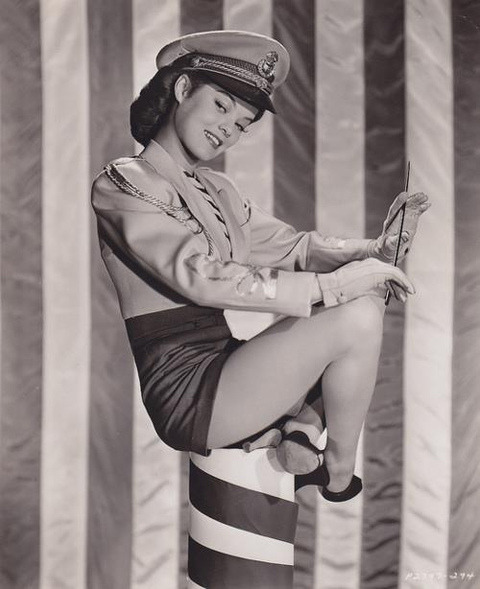The “Real” Mrs. William Travilla – Dona Drake
Travilla’s Legacy: Keeping True Fashion Alive
2013-11-07

In 1944, [William] Travilla met and married starlet Dona Drake, who at the time was more famous than he was having been in the entertainment industry for eleven years under several different names. Dona Drake, born Eunice Westmoreland, on November 5, 1914 to Joseph and Novella Westmoreland in Jacksonville, Florida. Jacksonville was a major port on the East Coast shipping lanes and due to it’s balmy weather, a vacation destination for Northerners seeking to escape the cold winters.
From 1907 until 1918, it also thirty permanent film studios. Known as “The Winter Film Capital of the World” and where Oliver Hardy got his start and until politicians, plus other factors forced the film makers to California, was a leading industry in the city. Life was good for most of Jacksonville’s residents, but not for the Westmorelands, as segregation was strictly enforced and though Dona claimed Latin heritage throughout her personal and professional career, Eunice Westmoreland was negro. Referred to as such in both 1920 and 1930 census records. Both parents were interchangeably referred to as negro and mulatto in the early 1900 censuses.
By 1930, Eunice’s family has relocated to Philadelphia with her father working in a chili parlor and her older brother enrolled in college. Eunice helped at the restaurant, but soon quit to pursue her life long dream of singing and dancing. By 1933 she had moved to New York City with her mother and another waitress named Rene Villion. Changing her name to Una, she and Rene formed a “sister act” and the pair found work at the Paradise Club on Broadway. Earl Carroll spotted her on stage one night and cast her in his production of Murder at The Vanities. When that ended, the girls toured until Rene left to get married and Una continued solo, performing in packaged tours headed by Rudy Vallée and Harry Richman. Returning to New York City, Una began dating a local Brooklyn mobster named [Louis] “Pretty” Amburg. In October of 1934, Amburg’s nude body was found in the trunk of a burning car. At the time, Una was in Hollywood, with a new name, Rita Rio, and filming her first movie, Strike Me Pink with Eddie Cantor…
Read the entire article here.
